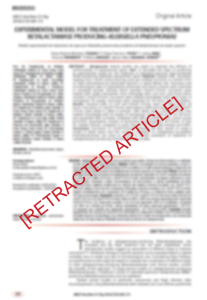 The following thought-provoking article by Bhavisha P. Sheth and Vrinda S. Thaker of the University of Saurashtra, in India, was published recently in the journal Acta Bioethica 20 (1) : 93 –97: “Scientific retraction: a synonym for pseudoscience¹”. Although the authors do not venture into a discussion as to what characterizes Science, reflecting upon Science itself and the current scientific context in which researchers must work, would be key to broadening out the debate in a meaningful sense.
The following thought-provoking article by Bhavisha P. Sheth and Vrinda S. Thaker of the University of Saurashtra, in India, was published recently in the journal Acta Bioethica 20 (1) : 93 –97: “Scientific retraction: a synonym for pseudoscience¹”. Although the authors do not venture into a discussion as to what characterizes Science, reflecting upon Science itself and the current scientific context in which researchers must work, would be key to broadening out the debate in a meaningful sense.
The current academic system exerts an intolerable pressure on researchers, contributing to an increase in the number of publications they must produce as a requirement for survival in the scientific environment. As a result of this process, it is the increase in the quantity of publications produced which is often given priority, to the detriment of their quality. The absence of effective monitoring by society as a whole and the deficiencies in the training provided to researchers as far as scientific integrity is concerned, can favor bad scientific practice which manifests itself in the form of plagiarism, falsification and fabrication, to name but three examples of this. In this context, it is striking that the number of retracted articles in highly rated scientific journals is growing.
There is no doubt that we are in agreement with the authors of the article cited above, when they point out the consequences that scientific misconduct can have for the credibility of scientific literature and for future studies. However, in addition to the harm done to Science itself, the damage caused by scientific misconduct also impacts upon individuals involved in research, society, researchers, research institutes and research funding agencies.
The article points out that retraction is a shameful phenomenon for the scientific community. In addition, the article refers to ethics as the fundamental constituent of Science itself; a violation of its rules would therefore constitute both pseudoscience and dishonesty. However, it is our duty to reflect upon the fact that Science is the product of fallible human beings with different agendas. The acknowledgement of those aspects which are involved in the process of scientific production is key to Science becoming less skewed. Gérard Fourez, in his book entitled “A construção das ciências”(The construction of the Sciences) is critical of those who hold an almost sacred conception of what Science is. Science shouldbe characterized by a focus on observations free from human factors which then allow for the formulation of laws which will be verified by logical and rational experiments. Fourez stresses that, previously, observations and models were seen as human representations, thus making it impossible to qualify them as being free from human nature. Nevertheless, the use of appropriate methods brings about a reduction in bias, enabling scientifically acceptable answers to be obtained, even if these do not constitute absolute truths.
Understanding that Science is not free from bias and that researchers, since they are only human, are biased in their hypotheses, in addition to possessing a capacity for what is both good and bad, it nevertheless seems key to us to invest in their academic training. This academic training should enable the researcher to take into account the consequences of scientific dishonesty, not only for his or her immediate sphere, but also for the entire scientific community itself. The training should also include a consideration of the legitimate interests of all those involved (participants, researchers and institutions) so that possible conflicts of interest can be recognized.
Scientific dishonesty is not a new phenomenon. Currently, globalization and developments in technology have assisted dishonesty in Science as much as they have hampered it. The article in question states that the review of a scientific work does not end at its publication. In fact, we know that an academic article, once published, goes through the “filter” of the academic community of specialists in the area in question, which is more effective in identifying errors or misconduct than the peer-reviewers associated with the given journal. As a consequence, many articles are retracted during this post-publication period.
Currently, most journals use software which detect plagiarism and self-plagiarism, so we believe that the global tendency will be a reduction in plagiarism and duplicate publication. However, errors and fraud in scientific outputs are detected with greater difficulty, as a result more effective monitoring by society as a whole is required.
The authors point out the serious nature of the fact that the scientific community continues to cite retracted works. This fact might demonstrate that the efforts of editors and the methods of publicizing notifications of retractions are still inadequate or insufficient. Authors, editors and reviewers have a great responsibility in assessing submissions, thus making it imperative that there be greater control over cases of scientific dishonesty and its dissemination in the editorial world.
In summary, dishonesty is not a recent development in the history of Science. The phenomenon of the increasing number of retractions due to errors or fraud represents a necessary response, even if it is only partially effective, and has come about as a result of society as a whole detecting what the authors refer to as “pseudo-science”.
Note
¹ Scientific retraction: a synonym for pseudoscience? – http://www.scielo.cl/scielo.php?script=sci_arttext&pid=S1726-569X2014000100010&lng=es&nrm=iso&tlng=en
References
FOUREZ, G. A construção das ciências. Introdução a filosofia e a ética das ciências. São Paulo: Universidade Estadual Paulista. 1995, pp. 91-92.
SHETH, B. P. and THAKER, V. S. Scientific retraction: a synonym for pseudoscience?. Acta bioeth. [online]. 2014, vol. 20, nº 1, pp. 93-97. Available from: http://www.scielo.cl/scielo.php?script=sci_arttext&pid=S1726-569X2014000100010&lng=es&nrm=iso
 About Liliane Lins
About Liliane Lins
Doctorate in Human Pathology – FIOCRUZ-FMB-UFBA. Full Professor of Bioethics FMB-UFBA. Full Professor of the Medical Program at the Escola Bahiana de Medicina e Saúde Pública. Associate Professor of the Department of Medicine at UFBA – Bahia, and of Ethics and Bioethics – DMPS.
Como citar este post [ISO 690/2010]:

















Read comment by Ernesto Spinak, in Spanish: http://blog.scielo.org/es/2014/09/30/retractacion-cientifica-y-seudociencia/#comment-6350